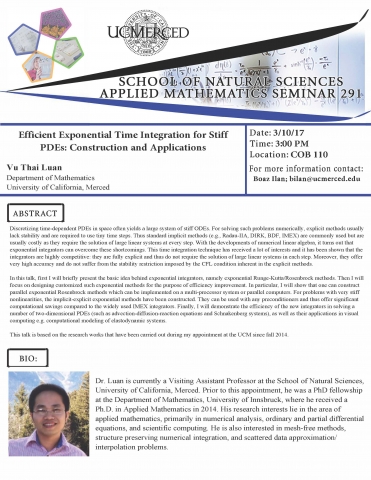
Vu Thai Luan, University of California, Merced
Abstract:
Discretizing time-dependent PDEs in space often yields a large system of stiff ODEs. For solving such stiff problems numerically, explicit methods usually lack stability and are required to use tiny time steps. Thus standard implicit methods such as implicit Runge-Kutta methods (e.g., Radau-IIA, DIRK), multistep methods (e.g. BDF) are commonly used. However, they are usually costly as they require the solution of large linear systems at every step. To overcome these two limitations, a novel time integration technique, the so-called exponential integrators, has been introduced. This field has attracted a lot of interest and has grown significantly since 1998. It has been shown that exponential integrators are highly competitive. In fact, they are fully explicit and thus do not require the solution of large linear systems in each step. Moreover, they offer very high accuracy and do not suffer from the stability restriction imposed by the CFL condition inherent in the explicit methods, meaning that they can take much larger time steps compared to classical methods.
In this talk, first I will briefly present the basic idea of constructing exponential integrators, namely exponential Runge-Kutta/Rosenbrock methods. Then I will focus on designing customized such exponential methods for the purpose of efficiency improvement. This is inspired by the fact that most of the constructed exponential schemes, due to their structures, cannot take full advantages of the recent developments of numerical linear algebra and parallel computer architecture. In particular, I will show that one can derive parallel exponential Rosenbrock methods which can be implemented on a multi-processor system or parallel computers. Moreover, for problems with very stiff nonlinearities, the implicit-explicit exponential methods have been constructed. They can be used with any preconditioners and thus offer significant computational advantages compared to the widely used IMEX integrators. The error analysis is performed in an abstract Banach space framework of strongly continuous semigroup. Convergence results are proved independently of the stiffness of the problem. Finally, I will demonstrate the efficiency of the new integrators in solving a number of two-dimensional PDEs (such as advection-diffusion-reaction equations, stiff Allen–Cahn equations, and Schnakenberg systems), as well as their applications in visual computing e.g. computational modeling of elastodynamic systems.
This talk is based on the research works that have been carried out during my appointment at the UCM since fall 2014.




